Rob Bignell's Blog, page 330
June 29, 2014
Five Great Quotations about Revising Your Book
“Any word 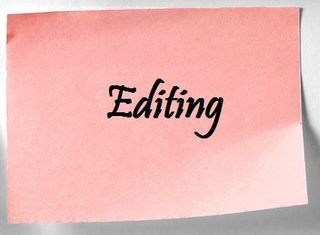 you have to hunt for in a thesaurus is the wrong word. There are no exceptions to this rule.” - Stephen King
you have to hunt for in a thesaurus is the wrong word. There are no exceptions to this rule.” - Stephen King
“The most valuable of all talents is that of never using two words when one will do.” - Thomas Jefferson
“Edit your manuscript until your fingers bleed and you have memorized every last word. Then, when you are certain you are on the verge of insanity…edit one more time!” - C.K. Webb
“I know that if I have been working on one paragraph and I have written it three times, it goes in the bin. Unless it comes straight out, it is wrong, it is awkward, it does not fit.” - Robert Rankin
“The wastepaper basket is the writer's best friend.” - Isaac Bashevis Singer
Need an editor? Having your book, business document or academic paper proofread or edited before submitting it can prove invaluable. In an economic climate where you face heavy competition, your writing needs a second eye to give you the edge. Whether you live in a big city like Detroit or a small town like Ford Cliff, Pennsylvania, I can provide that second eye.
<A HREF="http://ws-na.amazon-adsystem.com/widg... Widgets</A>Related articles
 Five great quotations about fiction
Five great quotations about fiction Five great quotations about writing
Five great quotations about writing How to get rid of Word's proofreading marks
How to get rid of Word's proofreading marks Use consistent quotation mark, apostrophe style
Use consistent quotation mark, apostrophe style Five great quotations about word choice
Five great quotations about word choice
June 28, 2014
Use catch-phrase when creating a character
When writing 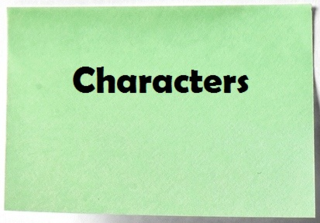 your story, you’ll want each of the major characters to be distinct. One of achieving that, especially in genre fiction, is to give a couple of the characters catch-phrases.
your story, you’ll want each of the major characters to be distinct. One of achieving that, especially in genre fiction, is to give a couple of the characters catch-phrases.
A catch-phrase is a short and memorable word or a phrase that a character repeats at apt times. Examples include Mr. Spock’s “Fascinating”, Dr. McCoy’s “I’m a doctor, not a …”, and Sherlock Holmes’ “Elementary, Dear Watson.”
A good catch phrase helps establish the character’s personality. “Fascinating” shows that Mr. Spock is innately curious, “I’m a doctor, not a …” establishes Dr. McCoy as a curmudgeon, and “Elementary, Dear Watson” indicates Sherlock Holmes is a genius.
Don’t overuse a catch-phrase in a story. A catch-phrase is just one of many techniques used to build a character. In addition, overuse leads to the catch-phrase becoming campy, diminishing its effectiveness.
Need an editor? Having your book, business document or academic paper proofread or edited before submitting it can prove invaluable. In an economic climate where you face heavy competition, your writing needs a second eye to give you the edge. Whether you come from a big city like San Antonio, Texas, or a small town like Dagsboro, Delaware, I can provide that second eye.
<A HREF="http://ws-na.amazon-adsystem.com/widg... Widgets</A>Related articles
 Basic guidelines for devising cliffhangers
Basic guidelines for devising cliffhangers Maintain sense of tension through pace
Maintain sense of tension through pace Maintain tone by avoiding subjective tension
Maintain tone by avoiding subjective tension
June 27, 2014
Place social media addresses in your book
While not  everyone who reads your book will like it, most will – and some will absolutely fall in love with your writing and become a fan. Such fans are likely to purchase more of your books or to tell others about your titles. One way to ensure those fans stay up-to-date about your writing (such as when that next book is coming out) or mention you in casual conversation is to keep them informed via social media.
everyone who reads your book will like it, most will – and some will absolutely fall in love with your writing and become a fan. Such fans are likely to purchase more of your books or to tell others about your titles. One way to ensure those fans stay up-to-date about your writing (such as when that next book is coming out) or mention you in casual conversation is to keep them informed via social media.
Because of this, you want to have a presence on a number of social media – a blog, Goodreads, Twitter, Facebook, YouTube, Pinterest and so on. Just as importantly, you want to let your fans know those social media addresses.
A separate page at the end of your ebook listing those addresses with working links is a good way to reach those using ereaders.
For your paperback, a good place to put them is on your back cover. They’ll be easy for the fan to find and will stand out for others to discover. Of course, with all of the social media addresses listed above – not to mention others you may have, such as Shelfari and your pages on Amazon.com or Smashwords.com – the list might be longer than the blurb for your book! In that case, place those addresses on both your title page and on a separate page at the end of your book.
Need an editor? Having your book, business document or academic paper proofread or edited before submitting it can prove invaluable. In an economic climate where you face heavy competition, your writing needs a second eye to give you the edge. Whether you come from a big city like Fort Worth, Texas, or a small town like Fort Green Springs, Florida, I can provide that second eye.
<A HREF="http://ws-na.amazon-adsystem.com/widg... Widgets</A>Related articles
 Getting started with formatting your ebook
Getting started with formatting your ebook Aim to simultaneously publish paperback, ebook
Aim to simultaneously publish paperback, ebook Distribute ebook on variety of ereaders, tablets
Distribute ebook on variety of ereaders, tablets Does your book cover design matter for ebooks?
Does your book cover design matter for ebooks?
June 26, 2014
What are the different levels of editing?
When seeking 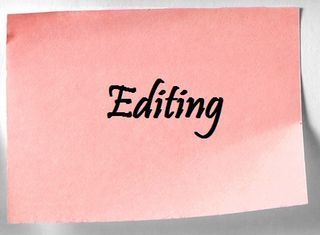 an editor for a book you intend to self-publish, you may run into a plethora of terms about the services they offer. Understanding these terms can help you determine what kind of editing you desire and allow you to better communicate that to an editor.
an editor for a book you intend to self-publish, you may run into a plethora of terms about the services they offer. Understanding these terms can help you determine what kind of editing you desire and allow you to better communicate that to an editor.
There are three major levels of editing:
g Proofreading – During a proofreading, the editor corrects spelling, punctuation, capitalization and basic grammar, and sometimes notes other minor matters, such as using passive voice (which is grammatically correct but could be changed to active voice for a smoother sentence structure). This level of editing also is known as copy editing.
g Line edit – In addition to proofreading, a line edit typically includes correcting sentence structure and flow as well as commenting on whether the content is complete and factual. This level also is known as a heavy edit or a content edit.
g Developmental edit – At this level, the editor goes a step beyond the line editing and rewrites sentences, which are tracked for the author to review and approve. This also is known as a substantive edit or structural edit.
Some editors list ghostwriting as a type of edit. In ghostwriting, another writer rewrites or pens from scratch whole passages for the author. In traditional publishing, this typically is done for celebrities. Arguably, this is not editing at all but simply writing a book for another person based on their outline or approval.
Need an editor? Having your book, business document or academic paper proofread or edited before submitting it can prove invaluable. In an economic climate where you face heavy competition, your writing needs a second eye to give you the edge. I can provide that second eye.
<A HREF="http://ws-na.amazon-adsystem.com/widg... Widgets</A>Related articles
 When to use affect vs. effect
When to use affect vs. effect How to get rid of Word's proofreading marks
How to get rid of Word's proofreading marks How to find a good editor or proofreader
How to find a good editor or proofreader
June 25, 2014
What’s the best choice: Okay vs. O.K. vs. OK
Which version 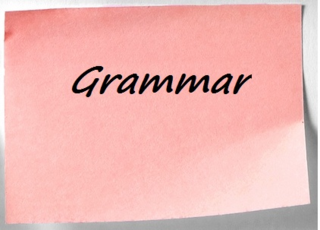 is “right”? Any one of the three is acceptable. However, whichever one you choose, be consistent by using only that spelling of the word throughout the manuscript.
is “right”? Any one of the three is acceptable. However, whichever one you choose, be consistent by using only that spelling of the word throughout the manuscript.
Personally, I prefer O.K. over OK and okay. OK also is an abbreviation for Oklahoma, so there is the potential for confusion in using that spelling. Okay takes up more space, and my prejudice is against longer versions of a word when shorter versions will do.
Need an editor? Having your book, business document or academic paper proofread or edited before submitting it can prove invaluable. In an economic climate where you face heavy competition, your writing needs a second eye to give you the edge. Whether you come from a big city like San Jose, California, or a small town like Roopville, Georgia, I can provide that second eye.
<A HREF="http://ws-na.amazon-adsystem.com/widg... Widgets</A>
Related articles
 How to get rid of Word's proofreading marks
How to get rid of Word's proofreading marks Tighten writing by cutting begin fallacy
Tighten writing by cutting begin fallacy Six useful tips for self-editing your book
Six useful tips for self-editing your book Five Great Quotations for Aspiring Writers
Five Great Quotations for Aspiring Writers
June 24, 2014
Editing client releases third book, ‘Devil’s Den’
A long-time 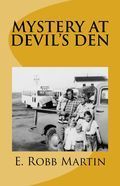 editing client of mine, E. Robb Martin, has published his third book. Based on a true story, “Mystery at Devil’s Den” follows the lives of several migrant workers, at a 1950s farm labor camp in California’s San Joaquin Valley, who one day find their lives turned upside down when the body of a Mexican teenager is found in their midst. Was the boy murdered, and if so, by whom? In addition to being an intriguing mystery, the book nicely records a slice of the history of farm labor camps that are so common in the coastal states. The novel can be purchased online.
editing client of mine, E. Robb Martin, has published his third book. Based on a true story, “Mystery at Devil’s Den” follows the lives of several migrant workers, at a 1950s farm labor camp in California’s San Joaquin Valley, who one day find their lives turned upside down when the body of a Mexican teenager is found in their midst. Was the boy murdered, and if so, by whom? In addition to being an intriguing mystery, the book nicely records a slice of the history of farm labor camps that are so common in the coastal states. The novel can be purchased online.
Need an editor? Having your book, business document or academic paper proofread or edited before submitting it can prove invaluable. In an economic climate where you face heavy competition, your writing needs a second eye to give you the edge. I can provide that second eye.
<A HREF="http://ws-na.amazon-adsystem.com/widg... Widgets</A>Related articles
 Editing client releases action-adventure novel
Editing client releases action-adventure novel Editing client, Ed Wyns, publishes first novel
Editing client, Ed Wyns, publishes first novel Client publishes short story, poetry collection
Client publishes short story, poetry collection Editing client releases novel based on true story
Editing client releases novel based on true story Editing client releases quest novel sequel
Editing client releases quest novel sequel
June 23, 2014
Be aware of which dramatic mode you’re using
When writing 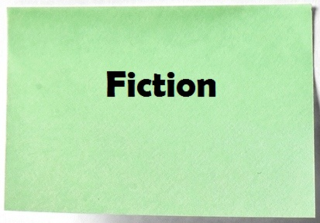 fiction, the tale tends to shift in the way the author tells the story. The method or approach used is called a mode. Being aware of which modes are available or that you’re using can help you determine how to best construct and revise your story.
fiction, the tale tends to shift in the way the author tells the story. The method or approach used is called a mode. Being aware of which modes are available or that you’re using can help you determine how to best construct and revise your story.
While literary critics going as far back as Aristotle defined modes, modern Western literature tends to utilize three major modes:
g Dramatic – These scenes are action-oriented. This does not necessarily mean a fight, battle or chase but that the characters are moving forward with obtaining their goals. In short, any scene that shows rather than tells is dramatic.
g Narration – These scenes are summarization-oriented. They provide information to the reader or a character in the story that allows future dramatic action to occur. Any scene that tells rather than shows is narration. In general, such exposition is eschewed in storytelling. Sometimes this also is known as summary narration or dramatic narrative.
g Introspection – Sometimes a character’s thoughts need to be conveyed as he thinks over his motivations and decides what action to take. This sometimes is referred to as internal dialogue, interior monologue, or self-talk.
Of course, as with any artistic effort, these modes are not so cut-and-dry. A half-scene, for example, blends the dramatic and narration modes. That’s because not all tales, especially those of various genres such as science fiction, romance and mysteries, need to do a little telling lest the work become too long to read. Arguably, the better written the half-scene, the greater it leans toward action rather than summary, meaning that is show more than tells.
Need an editor? Having your book, business document or academic paper proofread or edited before submitting it can prove invaluable. In an economic climate where you face heavy competition, your writing needs a second eye to give you the edge. Whether you come from a big city like Austin, Texas, or a small town like Fern Forest, Hawaii, I can provide that second eye.
<A HREF="http://ws-na.amazon-adsystem.com/widg... Widgets</A>Related articles
 Avoid card tricks in the dark when writing
Avoid card tricks in the dark when writing Crack a joke - but only for a good reason
Crack a joke - but only for a good reason
June 22, 2014
Five Great Quotations about Book Critics
“It is 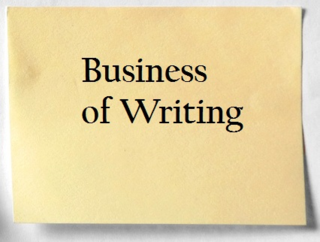 advantageous to an author that his book should be attacked as well as praised. Fame is a shuttlecock. If it be struck at one end of the room, it will soon fall to the ground. To keep it up, it must be struck at both ends.” - Samuel Johnson
advantageous to an author that his book should be attacked as well as praised. Fame is a shuttlecock. If it be struck at one end of the room, it will soon fall to the ground. To keep it up, it must be struck at both ends.” - Samuel Johnson
“Pay no attention to what the critics say; no statue has ever been erected to a critic.” - Jean Sibelius
“When a man publishes a book, there are so many stupid things said that he declares he’ll never do it again. The praise is almost always worse than the criticism.” – Sherwood Anderson
“I have long felt that any reviewer who expresses rage and loathing for a novel is preposterous. He or she is like a person who has just put on full armor and attacked a hot fudge sundae or banana split.” - Kurt Vonnegut, Jr.
“A critic is a man who knows the way but can't drive the car.” - Kenneth Tynan
Need an editor? Having your book, business document or academic paper proofread or edited before submitting it can prove invaluable. In an economic climate where you face heavy competition, your writing needs a second eye to give you the edge. Whether you live in a big city like Phoenix or a small town like Starr, South Carolina, I can provide that second eye.
<A HREF="http://ws-na.amazon-adsystem.com/widg... Widgets</A>Related articles
 Five Great Quotations about Book Critics
Five Great Quotations about Book Critics Place commas inside quotation marks
Place commas inside quotation marks Five Great Quotations for Aspiring Writers
Five Great Quotations for Aspiring Writers Five great quotations about book critics
Five great quotations about book critics Use consistent quotation mark, apostrophe style
Use consistent quotation mark, apostrophe style
June 21, 2014
What is a ‘blood and guts’ scene?
In storytelling, 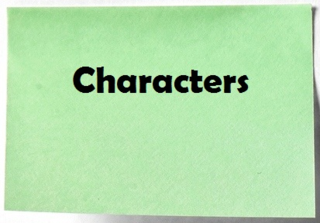 plot and characters are entwined to the point that one really could not exist without the other. Arguably, a story centers on the protagonist (character) solving a problem (plot). A story doesn’t exist if there’s if there’s no character attempting to solve a problem or if the character has no problem to solve.
plot and characters are entwined to the point that one really could not exist without the other. Arguably, a story centers on the protagonist (character) solving a problem (plot). A story doesn’t exist if there’s if there’s no character attempting to solve a problem or if the character has no problem to solve.
In some stories – especially action-adventure and space opera pieces – how the protagonist must resolve the problem requires that he become primal. In short, the character is “stripped of convention, artifice and propriety,” according to CSFW’s David Smith. Such an event in a story is nicknamed a blood and guts scene, a term that Smith coined.
A good example of a blood and guts scene in modern storytelling is Arnold Schwarzenegger’s character in the movie “Predator,” when he is forced to take on the alien alone. He covers himself in mud (to mask himself from the alien’s ability to spot heat via infrared) and relies purely on his animal instincts to carry the day.
Literary works also sometimes makes use of blood and guts scene. The climax of Stephen Crane’s “The Red Badge of Courage” essentially shows the protagonist becoming primal so he can garner the courage to live through the battle.
Need an editor? Having your book, business document or academic paper proofread or edited before submitting it can prove invaluable. In an economic climate where you face heavy competition, your writing needs a second eye to give you the edge. Whether you come from a big city like Cincinnati, Ohio, or a small town like Cincinnati, Iowa, I can provide that second eye.
Related articles
 Maintain sense of tension through pace
Maintain sense of tension through pace Coax readers to eat your story's veggies
Coax readers to eat your story's veggies
June 20, 2014
How to get into Barnes & Noble’s online catalog
Though getting  one’s book into the nation’s largest bookstore chain – Barnes & Noble – might be extremely difficult for self-published authors, what about getting it in their online catalogue? That would, after all, be the next best thing if not getting it on the chain’s brick and mortar stores.
one’s book into the nation’s largest bookstore chain – Barnes & Noble – might be extremely difficult for self-published authors, what about getting it in their online catalogue? That would, after all, be the next best thing if not getting it on the chain’s brick and mortar stores.
Achieving that will be tough, too, though not impossible. Generally, Barnes & Noble draws its book selection for the online catalog from a list of wholesalers and distributors (Among them are Bowker's Books In Print, Baker & Taylor, and Ingram). If you self-publish, your paperback usually isn't on one of those lists. The exception is if you use Sterling Publishing – a subsidiary of Barnes & Noble – to publish your book.
However, you as an indie publisher still can submit your book and hope for the best. To do that, you’ll need to become a “vendor of record” by completing and mailing a Publisher Information Form to Barnes & Noble’s distribution division.
Of course, a question you should ask yourself is if doing all of that work – with no guarantee of actually getting into a store – is really worth it. Arguably, there are better ways to tell the world about your book. Indeed, as the saying goes among authors, a bookstore is a great place to look at books but a lousy place to sell one.
The good news is that if you self-publish an ebook version of title, it has a very good chance of making Barnes & Noble’s online catalogue for its Nook. Smashwords offers a seamless method of achieving that, though mastering the company’s complicated ebook guideline can take a little effort for first-time authors.
Need an editor? Having your book, business document or academic paper proofread or edited before submitting it can prove invaluable. In an economic climate where you face heavy competition, your writing needs a second eye to give you the edge. Whether you come from a big city like Atlanta, Georgia, or a small town like Atlanta, Idaho, I can provide that second eye.
<A HREF="http://ws-na.amazon-adsystem.com/widg... Widgets</A>Related articles
 Distribute ebook on variety of ereaders, tablets
Distribute ebook on variety of ereaders, tablets Why bookstores don't carry self-published books
Why bookstores don't carry self-published books



